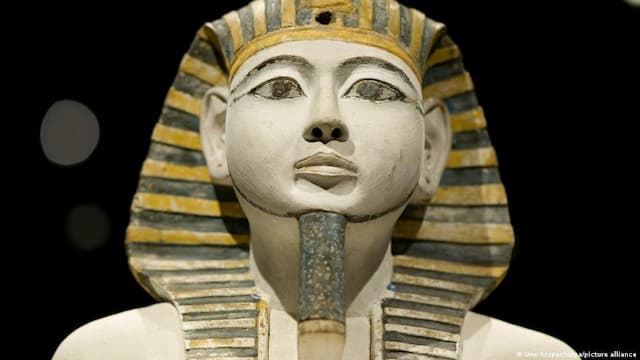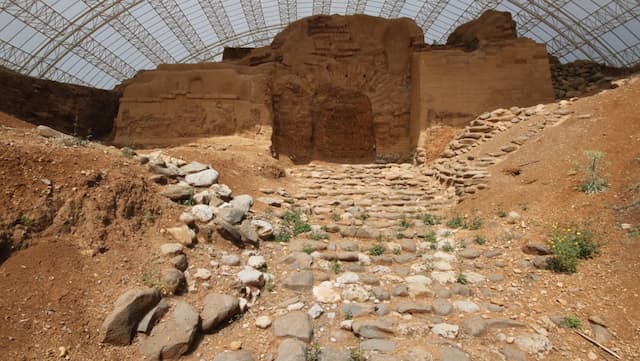But his enemies are still here (Matthew 28:11-15)

Why does Matthew interrupt the good news to tell us about a lie?
He was on a roll, describing Jesus’ victory over death. Risen. Reigning. Leading from the front like a shepherd. Authorizing angels to break death’s seal, to roll back the stone, to reveal the empty tomb. Then the risen king himself confirmed their commission and called them to the king’s council in Galilee.
So, why interrupt this climactic story of the Gospel to tell us the lie about the disciples stealing the body? There must be something here we really need to know.
The enemies who plotted Jesus’ death are still on the scene. Earthly rulers like Herod or Caesar would have no qualms about destroying their enemies, bringing those wretches to a wretched end (21:41). But that is not how God uses his power. God re-establishes his kingdom by giving life to his Son, not death to his enemies.
That means the enemies of Christ’s kingship are still present. And that has huge implications for us as we proclaim the good news that Jesus is raised and reigning.
Matthew 28:11-15 (my translation, compare NIV)
11 When the women had gone, some of the guards went into the city and told the chief priests all that had happened. 12 Meeting with the elders, they colluded together and took enough money to pay the soldiers to tell this story: 13 “Say, ‘His followers came during the night and took the body while we were asleep.’ 14 If this story reaches the Governor, we’ll convince him so you won’t have to worry.” 15 They accepted the money, and did as instructed. This story has circulated widely among Jewish people, even today.
Faced with the evidence that they were wrong about Jesus, his enemies wilfully refused to recognize the authority heaven gave him by raising him from the dead.
The temple leaders and elders had violated God’s command against premeditated murder when they colluded to have an innocent man executed (27:1). Now they violate his commandment about bearing false testimony: colluding to lie, to mislead the people, to deceive the Governor if the matter makes it to court. They corrupt the soldiers with a sizeable bribe, a fraudulent use of temple funds. God’s house had indeed become a den for bandits (21:13).
Enemies remain
Matthew’s point is that Jesus’ enemies still oppose him. He is risen and reigning, but those who want him out of the way still spread propaganda to support their own power rather than yield to his authority.
So, what do we do about that? How do we fight the disinformation? How do we overpower our enemies?
We don’t. It’s not our fight.
Jesus confronted the temple leaders for rejecting him, but he never tried to take their power from them. Power is God-given, not taken. Jesus believed the Ancient of Days would intervene, take the power from the beasts, and give it to the Son of Man. Being the true human descendant defined him, in contrast with the beasts who tear each other apart for power.
So, Jesus’ plan for how he would overcome his enemies was simple. He would sit and wait for the one who said, Be seated on my right, until I place your enemies beneath your feet (22:44). His enemies still spread propaganda against his authority, but he does not commission us to fight them. The falsehood will eventually fall under its own weight. His authority will prevail. Eventually his enemies will be brought under his feet.
What he calls us to do is announce and embody the good news of his kingship, as the family of his Father. He will reign until the last enemy is under his feet, death’s dominion is gone, and earth is fully restored to his Father’s reign (1 Corinthians 15:24-28).
Suffering servants
Remember when Jesus sent out his followers, warning they would be as safe as sheep among wolves? (10:16) Father cares when every sparrow falls, but he does not intervene to prevent our deaths any more than to prevent Jesus’ death (10:28-31). To be worthy of him, we’re called to take up our crosses and follow him, even if it means losing our lives (10:37-39). That was what happened to most of the Twelve.
Remember the Suffering Servant in Isaiah? Many Christians jump straight to Jesus, the one who took up our pain and bore our suffering … was pierced for our transgressions and crushed for our iniquities (Isaiah 53:4-5). But that’s only part of the story. The Servant was the people of God: Israel my servant (41:8-9; 45:4; 49:3-7). God called his nation to be a light to the nations (42:6; 49:6; 51:4; 60:3). But faced with the injustice of how the nations had treated them, they had not been a faithful witness to God’s character (43:9-12). That’s why God rolled up his sleeves and came to do for them what they could not do for themselves, becoming the suffering servant of his people (52:10; 53:1).
And what he has done for us, we’re called to do in his world. We are his suffering servants, bearing away the sin of the world, the rejection of the Son, God’s people are called to follow the Suffering Servant who faced crucifixion rather than fight his enemies, to be a suffering servant trusting him to restore all things, to be a faithful witness to the character of God, suffering as abused body.
Enduring authority
Our present suffering is not worth comparing to the weight of glory our King will receive when God has set all things right for his family (Romans 8:20-25). His resurrection is our future.
Darkness covered the earth,
and thick darkness oppressed his people,
but the Lord rises upon you
and his glory appears over you.
Nations will come to your light,
and kings to the brightness of your dawn. (Isaiah 60:2-3)
We aren’t called to fight the lies or drive out the darkness. We’re commissioned as a faithful witness to Christ’s restorative reign, a light to the nations, teaching the nations to live as he commands. The king is already present, reigning in his people, and he will continue to do so until this age is complete (28:19-20).
Other faiths may retaliate if someone mocks their prophet. But Christians carry away the pain, even in the face of malicious lies. We do that because we know his kingship is already here, given by heaven on the day he was raised from the dead.
Raised and reigning. That’s the good news, the gospel we proclaim and embody.
What others are saying
Peter Kreeft and Ronald K. Tacelli, Handbook of Christian Apologetics (Westmont, IL: IVP Academic, 1994), 177:
The greatest importance of the resurrection is not in the past — “Christ rose” — but in the present — “Christ is risen.” The angel at the tomb asked the women, “Why do you seek the living among the dead?” (Lk 24:5). The same question could be asked today to mere historians and scholars. If only we did not keep Christ mummified in a casket labeled “history” or “apologetics,” he would set our lives and world afire as powerfully as he did two millennia ago; and our new pagan empire would sit up, take notice, rub its eyes, wonder and convert a second time. That is the existential import of the resurrection.
Jeannine K. Brown, Matthew, Two Horizons NT Commentary (Grand Rapids, MI: Eerdmans, 2018), 261:
Between the two commissioning scenes, Matthew interposes an account of the bribing of the soldiers who were guarding the tomb, a companion pericope to 27:62–66. Pilate had authorized the Jewish leaders to secure the tomb with extra guards (27:65), who now report what has happened to those leaders. The Jewish leaders pay off the soldiers to claim that Jesus’s disciples stole the body while they were sleeping (28:13). The leaders also promise to vouch for the soldiers with Pilate should he hear anything about the guards falling asleep on duty (28:14). With this plan, Matthew portrays the Jewish leaders — and specifically the priests and elders — as continuing to work against Jesus’s ministry and mission even in the last moments of the narrative (cf. 21:23; 26:3, 47; 27:1, 12). Though they claim that Jesus is a deceiver (27:63), Matthew suggests narratively that they are the ones who promote deception. Matthew steps outside of the story world to note that this false account of Jesus’s body being stolen has continued to circulate among Jews even to the time of the Gospel’s composition (28:15).
Related posts
- Like our teacher (Mt 10:24-25)
- Son of man: suffering king (Mt 16–17)
- Making sense of suffering when Christ is king (Eph 3:1)
- More than conquerors (Rom 8:37)
- The truth about lying (Eph 4:25)
Seeking to understand Jesus in the terms he chose to describe himself: son of man (his identity), and kingdom of God (his mission). Riverview Church, Perth, Western Australia
View all posts by Allen Browne











